Serendip is an independent site partnering with faculty at multiple colleges and universities around the world. Happy exploring!
Notes Towards Day 25: The Jameses Come to Bryn Mawr

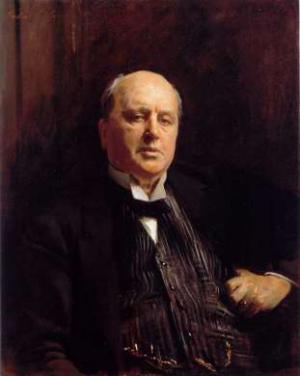 |
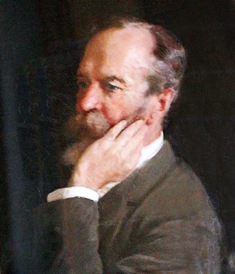 |
I. course evaluations
II. volunteer note-taker? (exsoloadsolem??)
III. your last set of papers:
I never been so delighted w/ a set of 'em
(and here I'd been thinking the WJ
section of the course had failed...
maybe all our floundering is what actually
made these projects so generative??)
also delighted w/ your callouts to your audience-->
aseidman: re-stage the play
jrlewis: present a counterargument, dear reader
Penguins: "Hello, and welcome Mr. James! It’s so good to have you visit, especially to explain a good several things to me concerning your writings.
William James: Certainly; but only, of course, if you draw your own conclusions from what I have to say. It does not seem very practical to follow every word that I say to the letter, since in doing so you would only be compromising the idiosyncratic nature of your own personal philosophy."
check out the variety: plays, cartoons, images, a recipe,
a medical history lesson, an addict's chatty blog...
III. sign up sheet for final performances
IV. review end-of-semester arrangements re: portfolios, etc.
ALSO IMPORTANT! PLEASE SCHEDULE A CONFERENCE
W/ME BEFORE THE PORTFOLIO IS DUE--
anytime between today and May 14th:
after you have a proposal, but
before it's set in stone...
V. today our (first of several) summative events:
listening to quite the line-up of graduation speeches!
which (if any) speak to you?
what would you say back, to any of these speakers?
what would you say, if asked to give such speech?
(what do BMC graduates need to be asked to "attend" to....?)
On February 9, 1896, William James wrote to his brother, "I came here yesterday PM. to give an 'address' at Bryn Mawr College, the gilt edged feminine institution of the country. There is something quite intoxicating in this addressing of young girls--they look so pretty and are so electrically responsive...."
[According to Robert Richardson,] the young women received this talk with "resounding, and as it were oceanic applause," as the delighted speaker
reported to his colleague...
[His daughter Peg was admitted to Bryn Mawr in fall 1905...
in January 1907 he made a quick trip to give a talk for Peggy and Bryn Mawr....
"This year Peggy began a serious, intense friendship with a student at Bryn Mawr named Marianne Moore. Peggy had occasional headaches like her mother's, she was prone to spells of depression, but she could also be vivacious and entertaining...."]
"The Gospel of Relaxation" (1907):
by regulating the action we can indirectly regulate the feeling
"if we act as if from some better feeling, the old bad feeling soon folds its tent like an Arab, and silently steals away"
about the Binnenleben, or buried life of human beings:
the sort of unuttered inner atmosphere in which his consciousness dwells alone with the secrets of its prison-house...we can't communicate or describe articulately to others; but the wraith and ghost of it
sedentary fireside tabby-cats of Norway...trained...into lithe and audacious creatures
what need ... of well-developed muscles ... of teeth, or stomachs ... while ... grow the gigantic domes of our crania, arching over our spectacled eyes, and animating our flexible little lips ... I am sure that your flesh creeps at this apocalyptic vision
"living like an army with all its reserves engaged in action ... tone yourselves down ... you take too intensely the trivial moments of life"
the over-contracted person: from the over-tense excited body the over-tense and excited habit of mind is kept up ... what mental mood can you be in but one of inner panting and expectancy....?
this bottled-lightening quality .... The American over-tension and jerkiness and breathlessness and intensity and agony of expression are primarily social....They are bad habits...
We must change ourselves ... to [a race] that has calm for its deal, and ... loves harmony, dignity, and ease.
strong feeling about one's self tends to arrest the free association of one's objective ideas and motor processes .... His mind ... fixed as if in a cramp on these feelings of his own situation ... the usual varied flow of ... thoughts has ceased ... associative processes ... are inhibited ... ideas stand stock-still ...
If ... we wish our trains of ideation and volition to be copious and varied and effective, we must form the habit of freeing them from the inhibitive influence of reflection upon them, of egoistic preoccupation about their results ... once a decision is reached ... Unclamp ... your intellectual and practical machinery, and let it run free .... Who are the scholars who get rattled .... Those of think of the possibilities of failure and feel the great importance of the act ...forget their scruples and take the brakes off their hearts, and let their tongues wag as automatically and irresponsibly as they will.
prepare yourself in the subject so well that it shall be always on tap: then in the class-room trust your spontaneity and fling away all further care ...
Just as a bicycle-chain may be too tight, so many one's carefulness and conscientiousness be so tense as to hinder the running of one's mind .... Worry means always an invariably inhibition of assocaitiosn and loss of effective power ...
The need of feeling responsible all the livelong day has been preached long enough ... to the female sex .... What our girl-students ... most need nowadays is ... the toning-down of their moral tensions ... genuinely not to care whether you are doing it or not .... then, possibly ... you may ... be enabled to go on.
Calamity took a stand against James's argument of "faking it into being"...
______________________________________
Normal.dotm
0
0
1
93
534
Bryn Mawr College
4
1
655
12.0
0
false
18 pt
18 pt
0
0
false
false
false
From The Portable Henry James, Ed. John Auchard: “The Question of our Speech” was delivered in 1905 as The Bryn Mawr College commencement address during the American tour of 1904-1905. In this quietly hammering lecture, James aims to correct the careless speech patterns and unappealing “tonal quality” of the young American woman. As Leon Edel notes in Henry James: The Master, the lecture raised controversy. Letters to the editor objected to James’s own overly complex language, and Woodrow Wilson, then president of Princeton University, declared a preference for the direct prose of the American newspaper over the novelist’s “laborious” style.”
Henry James, "The Question of Our Speech" (1905):
speech promotes the refinements ... of intercourse, intellectual and social ..."we are heirs and mistresses of the art of making ourselves satisfactorily heard, conveniently listened to, comfortably and agreeably understood"
I can only stand before you ... as a breaker of the silence ... there is an element of fallacy ... in the fine confidence I am thus feeling my way to impute to you.
All life comes back to the question of our speech ... of our relations with each other ... constituted by our speech .... Of the degree in which a society is civilized the vocal form ...give[s] a direct reflection.
against a care for tone ... the elements of life in this country ... violently and increasingly militate .... the idea of good breeding ...of secure good manners ....
Taking thought ... obtaining a tone-standard ... avoiding vulgarity, arriving at lucidity, pleasantness, charm ... a colloquial, a genial value ...[or] reduce articulation to .. the grunting, the squealing, the barking or the roaring of animals ...
the civility of utterance .. must be a collective and associated habit .. a beneficent contagion ... of sensibility to tone ...
there is a great blatant, blowing dragon to slay .... see any standard raised to the breeze ... the character of the enemy you are to overcome ...
take it from me, as the very moral of these remarks, that the way we say a thing ... has ... a far-reaching importance, as the very hinge of the relation of man to man ... vociferous demonstration of the plea that the way we say things ... has ... little importance ... shall begin to flounder waist-high in desert sands.
Want of attention .. results in a graceless and unlighted effect, an effect of accident and misadventure ... going on, gropingly, helplessly, empirically, almost dangerously ... in the dark .... To do things "unlightedly" is ... to do them without neatness or completeness ... to accept the doom of the slovenly ....
Our national use of vocal sound ... is slovenly .... a mere helpless slobber of disconnected vowel noises ....consonantal sound drops out ... our loss ... of the power to emulate the clearness of the vowel-cutting .... bringing [an r] in everywhere as with the small vulgar effect of a sort of morose grinding of the back teeth ... sounds of a mysterious intrinsic meanness .... the principle of taste has dropped .... the s, too, breaks in, or breaks out, all unchecked and unchided ... the deplorable effect of the almost total loss ... of any approach to purity in the sound of the e ... This note of..the cheap and easy ... is especially fatal to any effect of security of intention...
a certain portent in our sky, a certain lion in our path...
the unsettled character and the inferior quality of the colloquial vox Americana ... a product of that mere state of indifference to a speech-standrad and to a tone-standard .... To discriminate, to learn .. to begin to prefer form ... color ... manners themselves ....
the adventure ... of our idiom and the adventure of our utterance has been fundamentally the same adventure .... they ... immigrated together, into the great raw world ... left to run wild and lose their way together ... no language .. has known any such ordeal ... It came over .. to find itself transplanted to spaces it had never dreamed ... of covering ... grafted ... on a social and political order that was both without previous precedent and example and incalculably expansive.
it may doubtless be said to have behaved as well as unfriended heroine ever behaved in dire predicament ... our transported maiden ... was to be disjoined from all the associations, the other presences, that had attended her.
To the American common school, to the American newspaper .. we have simply handed over our property .. distracted, dishevelled, despoiled, divested of that beautiful and becoming drapery of native atmosphere and circumstance...
newspapers .. affect us positively as the roar of some myriad-faced monster--as the grimaces, the shouts, shrieks, and yells ... of a mighty maniac who ... is running amuck through the spheres alike of sense and of sound.
All the while we sleep the vast contingent of aliens.. are sitting up (they don't sleep!) to work their will on their new inheritance ... without any finer feeling or more conserative instinct of consideration for it ... Oilcloth is highly convenient ... wonderfully resisting "wear" ... an excellent bargain: durable, tough, cheap.
I may be asked ... whether language be not always a living organism, fed by the very breath of those who employ it ... to respond ... to the constant appeal of time ... a hundred times, "Yes," assuredly, so long as the conservative interest, which should always predominate, remains, equally, the constant quantity .... The conservative interest is really as indispensable for the institution of speech as for the institution of matrimony. Abate a jot ... and we practically find ourselves emulating the beast, who prosper as well without a vocabulary as without a marriage-service.
...the forces of looseness are in possession of the field...
I urge upon you ... an acute consciousness .... Unconsciousness is beautiful when it means that our knowledge has passed into our conduct and our life; has become, as we say, a second nature. But the opposite state is the door through which it has to pass, and which is, inevitably, sometimes, rather straight and narrow. This squeeze is what we pay for having revelled too much in ignorance. Keep ... the sight ... of the blue horizon ... the wide fair country ...
you may, sounding the clearer notes of intercourse as only women can, become yourselves models and missionaries, perhaps a little even martyrs, of the good cause.
What is the relation of these two talks to one another?
What's a graduate to do??
(Be more responsible or less, more conscious or less...?)
William: The need of feeling responsible all the livelong day has been preached long enough ... to the female sex .... What our girl-students ... most need nowadays is ... the toning-down of their moral tensions ... genuinely not to care whether you are doing it or not.
Cf. to Henry: ... the forces of looseness are in possession of the field ... I urge upon you ... an acute consciousness ....you may... become yourselves models and missionaries, perhaps a little even martyrs, of the good cause.
And what happens when we put the Jameses' (contradictory?)
advice into dialogue with that of two 20th c. female speakers?
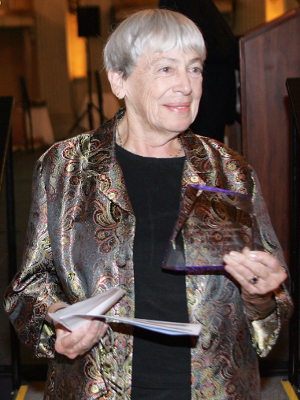 |
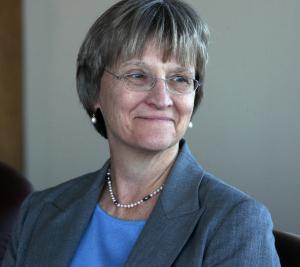 |
Ursula LeGuin, Bryn Mawr Commencement Address (1986):
call to combine "male" and "female" languages,
the "objective" and the "subjective,"
the "distanced" and the "up close,"
into a new "baby language," of art.
Drew Faust, Convocation Address (2001):
need for ritual to resist the inexorability, consequent tyranny of time,
articulate meaning in otherwise uninterpreted chaos of daily routine:
"act out things we cannot put into words,"
mark loss, note impermanence, rupture:
a significant gesture of existential and ontological resistance
the burden of Bryn Mawr tradition:
overwhelmed with a sense of the sacredness
of work as our highest calling;
in danger of letting our work tyrannize us;
risk becoming victims and instruments of the
expectation this devotion to work creates.
Noticing your life, reflecting upon it, is perhaps the most valuable thing that a liberal arts education has equipped you to do. A liberal education demands that you live self-consciously. It has made you an analyst and critic of yourself, a person in this way supremely equipped to take charge of your life and its passage. It is in this sense that the liberal arts are liberal – as in liberare – to free. They empower you with the possibility for agency, for imposing meaning, for making choice.
 |
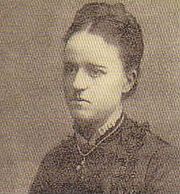 |
...and (given the opportunity!) what might Alice have said??
(Let's give her the opportunity, and write her speech....?)


